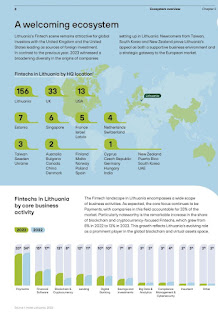Amount of fundraising by Lithuanian fintech startups decreased by 12 times to €5,5M in 2023
In 2023, Lithuanian fintech startups raised only €5,5M of venture fundraising, which is 12 times less than the amount raised in 2022 (€67,9M). This data was noted in the 2023 fintech report of the government investment promotion agency Invest Lithuania. The report highlighted that regtech, green finance, and DeFi, where AI and quantum computing were used a lot, were the main areas that secured investments.
Payments, financial software, blockchain, and cryptocurrencies were the most active areas in the Lithuanian fintech sector in 2023, accounting for 33%, 15%, and 13% respectively. 156 companies were headquartered in Lithuania, while 33 and 13 companies were based in the UK and the US, respectively, indicating that investors from other countries also found the Lithuanian fintech sector attractive.
Of the companies surveyed, 57% did not plan to seek additional funding in the next funding round. Among the startups that were seeking investment, 22% aimed to secure less than €10M. Only 10% of fintech companies aimed to raise from €11M to €20M, and an equal 1% aimed to raise from €21M to €50M and more than €50M.
Invest Lithuania's report on the Lithuanian fintech sector in 2023 highlighted several key findings. 55% of the startups surveyed preferred the revenue growth model as a source of funding, while 46% of them opted for private equity - 46% of startups, and 26% for venture capital.
In terms of funding stages, the report found that 39% of startups were in revenue-based funding, 8% in pre-seed stage, 14% in seed stage, and 13% in Series A. The minority of fintech startups were at the later stages of funding or IPO.
In 2023, the number of new jobs in the Lithuanian fintech sector increased by 400 compared to 2022. However, the average number of employees remained stable at 27. Additionally, 40% of fintech startups were looking to hire specialists with software development skills the most, while demand for professionals with compliance/ AML decreased from 51% to 29%.
Invest Lithuania's report showed that 88% of the fintech workforce was under 45, and women accounted for 45% of the overall workforce, 43% of executive positions, and 25% of technical roles. As of the end of 2023, Lithuania was one of the top seven European countries by the number of payment institutions (30) and electronic money institution licenses issued (79).
Looking ahead to 2024, the report found that 75% of fintech companies anticipate revenue growth, with over 30% expecting their revenues to more than double. Additionally, 49% of startups plan to hire 1-4 new employees, 16% from 5 to 9 people, and only 5% more than 51% employees. In terms of sectors, Lithuania is expected to be a leader in the EU in the payments sector (57%), compliance and regtech (51%), and AI and data analytics in finance (35%).
The report was conducted by Invest Lithuania, which included desk research and an online survey of Lithuanian companies. The report defines fintech as companies that undertake activities related to the use of innovative business models and technology to enable, enhance, or disrupt financial services. At the end of 2023, 276 fintechs had a legal entity and operated in Lithuania, among which there were 140 licensed fintechs, and 7,4K people employed in fintechs.


.png)